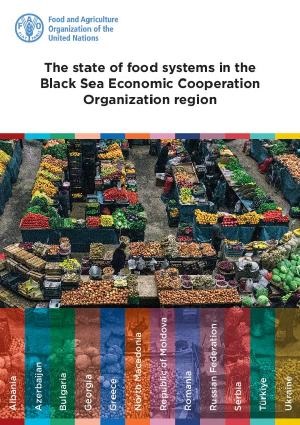Comprehensive analysis provides in-depth assessment of agrifood systems in the Black Sea region

©FAO/Sanja Knežević
The Food and Agriculture Organization of the United Nations (FAO) has released a flagship report entitled The state of food systems in the Black Sea Economic Cooperation Organization (BSEC) region, offering a detailed analysis of agrifood systems across the Black Sea region, highlighting key trends, challenges and opportunities in 12 countries. The publication was produced under the Black Sea Economic Cooperation Organization Regional Cooperation Centre for Sustainable Food Systems project, which was launched in December 2020 through the FAO–Türkiye Partnership Programme on Food and Agriculture.
The comprehensive assessments conducted during the project’s tenure provided an in-depth, systematic analysis of food systems at both national and regional levels. These findings, now consolidated in the flagship publication, offer valuable insights and guidance for member states as they continue to develop sustainable agrifood practices and policies.
Documenting the transformation of consumer food preferences, the industrialization and globalization of agrifood systems, and the resulting impacts on food security, nutrition and sustainability, the report serves as a resource of reference for policymakers, researchers and actors invested in promoting sustainable food systems. The report also presents current dynamics of food systems in the Black Sea region and proposes pathways for transformative action to promote sustainability, resilience, and improved nutrition outcomes.
“Building climate resilience is critical to the future of farmers as well as land, water and food resource worldwide. We need to find the right balance between food production and the preservation of environmental ecosystems,” wrote Özge İmamoğlu, the coordinator of the Centre in the report’s foreword.
The diversity of the 12 member states of the Black Sea Economic Cooperation Organization analysed means that any solution to emerging challenges may not be applicable in all countries. However, the report has identified areas of common concern that merit further collaboration and shared learning at the regional scale. The main challenge in this regard is to ensure that food systems are sustainable, resilient, inclusive and contribute to healthy diets, and improved nutrition.
Food systems in the concerned countries provide sufficient calories to meet food security needs but the increasing prevalence of overweight and obesity in adults and children raises concerns around dietary diversity and nutritional quality. The economic weight of the food and agriculture sectors continues to decline due to structural transformations in these countries coupled with low technology adoption and limited innovation across the region. Despite this trend, food systems remain critical for rural income and employment, even if it does not constitute a clear pathway out of poverty for rural populations, which are decreasing in size due to on-going outmigration, limited opportunities, and aging populations. Food systems in the region perform comparatively well environmentally but face emerging challenges related to climate change, including water stress, pest and disease pressures, and an overall need to improve sustainability.
The FAO project “Black Sea Economic Cooperation Organization Regional Cooperation Centre for Sustainable Food Systems” has contributed to strengthening food systems transformation in the region. By enhancing institutional capacities through a holistic food systems approach that prioritizes sustainability and equity, the project has laid the groundwork for more resilient and inclusive agrifood systems in the Black Sea Economic Cooperation region.

